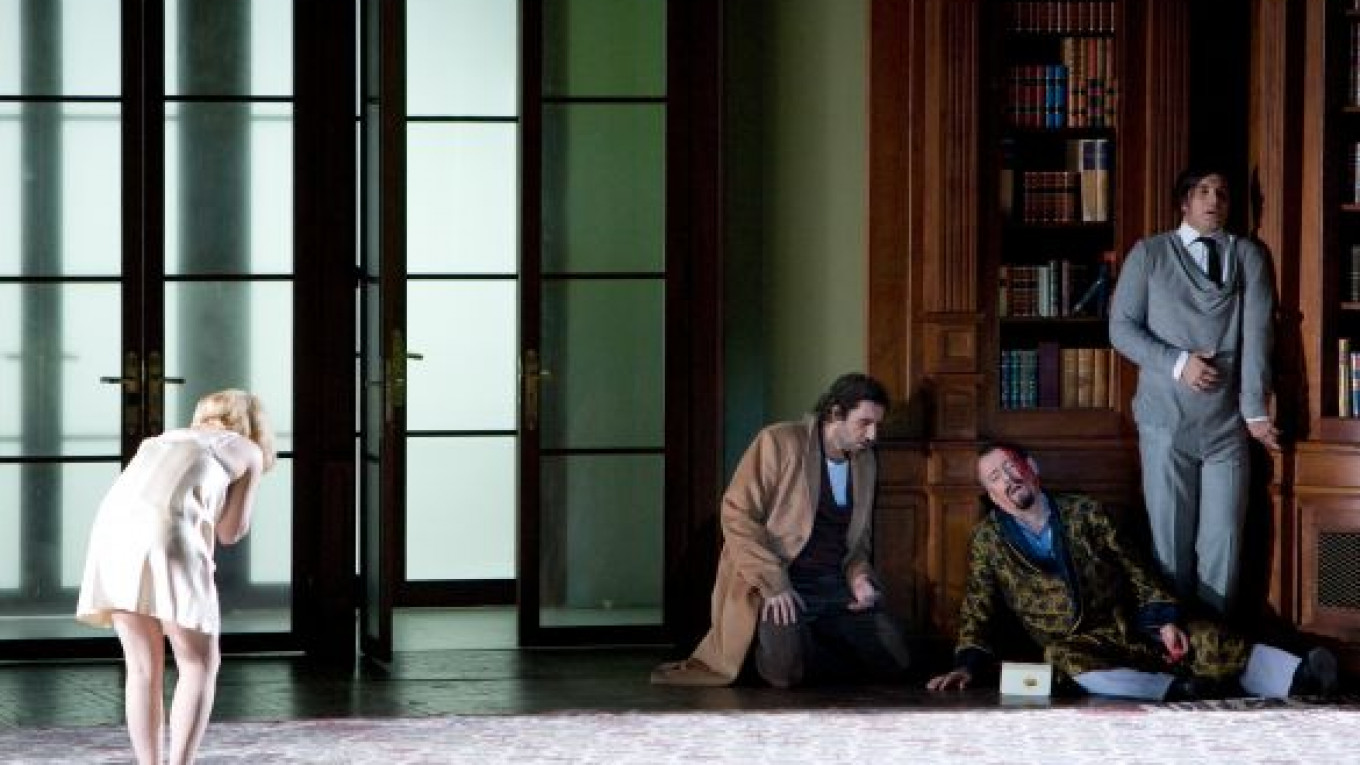Wolfgang Amadeus Mozart’s opera “Don Giovanni,” once described by French composer Charles Gounod as “a work without blemish, of uninterrupted perfection,” returned to the Bolshoi Theater at the end of October in its first new production there since 1950.
The staging was originally entrusted to the well-known Moscow theater director Anatoly Vasilyev. But Vasilyev withdrew from the production last spring, citing the physical limitations of the Bolshoi’s New Stage and a lack of adequate rehearsal space. Determined to keep “Don Giovanni” on its schedule for the current season, the Bolshoi latched on to a co-production of the Aix-en-Provence Festival, in France, where it premiered last June, and opera houses in Madrid and Toronto, in a staging by Dmitry Chernyakov, the highly skilled, but controversial director of three Bolshoi productions over the past decade.
Until last season, I had very much admired Chernyakov’s imaginatively constructed stagings both at the Bolshoi and at the Mariinsky Theater, all of which offered a great deal by way of fresh insight into characters and situations, but remained essentially true to the intentions of the operas’ respective librettists and composers.
But I found myself parting ways with Chernyakov last November, when he brought to the Bolshoi a splendidly directed but totally distorted version of Alban Berg’s “Wozzeck,” which transformed the poverty-stricken and mentally unbalanced character of the opera’s title into a disaffected member of the present-day urban middle class.
Unfortunately, Chernyakov has done much the same with “Don Giovanni.” As he interprets the opera, its eight characters are all members, or potential members, of a single dysfunctional modern family: Donna Anna is the Commendatore’s daughter and engaged to Don Ottavio, as in the original story; Zerlina becomes Donna Anna’s daughter from a previous marriage and, as in the original, is the fiancee of Masetto; Donna Elvira is transformed into Donna Anna’s cousin and the wife of Don Giovanni; and Leporello, Don Giovanni’s servant in the original, becomes a young relative of the Commendatore and Don Giovanni’s pal. The entire action of the opera takes place in the elegant, paneled library of the Commendatore’s home.
All of this might possibly have worked, were it not for the distortions of character that Chernyakov introduces and the tediousness of his mise-en-scene. Worst of all is what he does to the Don of the opera’s title, turning him into a hopeless alcoholic who lacks any trace of the charisma and charm that must surely have been needed to seduce — according to Leporello’s meticulously kept catalogue of the Don’s amours — some 1,003 women in Spain and a slightly larger number on sojourns in Italy, Germany, Turkey and France.
“Don Giovanni” tells a universal tale and is certainly adaptable to places and times other than the early 17th-century Spain specified in its libretto. But whatever may be its setting, the brilliance of Mozart’s music and Lorenzo da Ponte’s libretto must surely be allowed to shine through, not played havoc with, as in the case of Chernyakov’s staging.
Despite the foolish contortions forced on them by the director, the two casts, almost entirely imported from elsewhere, sang for the most part at a level well above what is usually heard these days at the Bolshoi. The very best in both casts were the Donna Elviras: South Ossetian-born Veronika Jioeva, imported from Novosibirsk, and the Bolshoi’s own superb Yekaterina Shcherbachenko, both of whom produced singing of extraordinary elegance.
The Bolshoi orchestra had obviously been well drilled by conductor Teodor Curentzis in late 18th-century performance style. But Curentzis rather undermined its efforts with what seemed exaggerated dynamic contrasts and, at times, almost ludicrously fast tempos.
“Don Giovanni” received a host of favorable reviews at its premiere in Aix last summer and seems to have generally pleased the audiences there. Moscow received it quite differently. A notably unenthusiastic audience at the premiere for the most part stuck it out to the end. But at the sixth and final performance, and reportedly at the four others that followed opening night, audience members began departing in droves even before the curtain fell on the first act. When or if the production will play again at the Bolshoi has not yet been announced. Unfortunately, perhaps, it might still return this season, as it has not been scheduled for Aix next summer or for either of its other co-producing theaters until at least next fall.
Considering Chernyakov’s successes at the Bolshoi, the theater can hardly be blamed for turning to him for a substitute “Don Giovanni.” It might, however, reconsider his engagement as director of Mikhail Glinka’s “Ruslan and Lyudmila” at the re-opening next season of the theater’s main stage. Even Moscow’s most progressive-minded opera-goers are likely to find treating one of the most sacrosanct of all Russian operas in what appears to be Chernyakov’s current style to be an act little short of blasphemy.
A Message from The Moscow Times:
Dear readers,
We are facing unprecedented challenges. Russia's Prosecutor General's Office has designated The Moscow Times as an "undesirable" organization, criminalizing our work and putting our staff at risk of prosecution. This follows our earlier unjust labeling as a "foreign agent."
These actions are direct attempts to silence independent journalism in Russia. The authorities claim our work "discredits the decisions of the Russian leadership." We see things differently: we strive to provide accurate, unbiased reporting on Russia.
We, the journalists of The Moscow Times, refuse to be silenced. But to continue our work, we need your help.
Your support, no matter how small, makes a world of difference. If you can, please support us monthly starting from just $2. It's quick to set up, and every contribution makes a significant impact.
By supporting The Moscow Times, you're defending open, independent journalism in the face of repression. Thank you for standing with us.
Remind me later.






